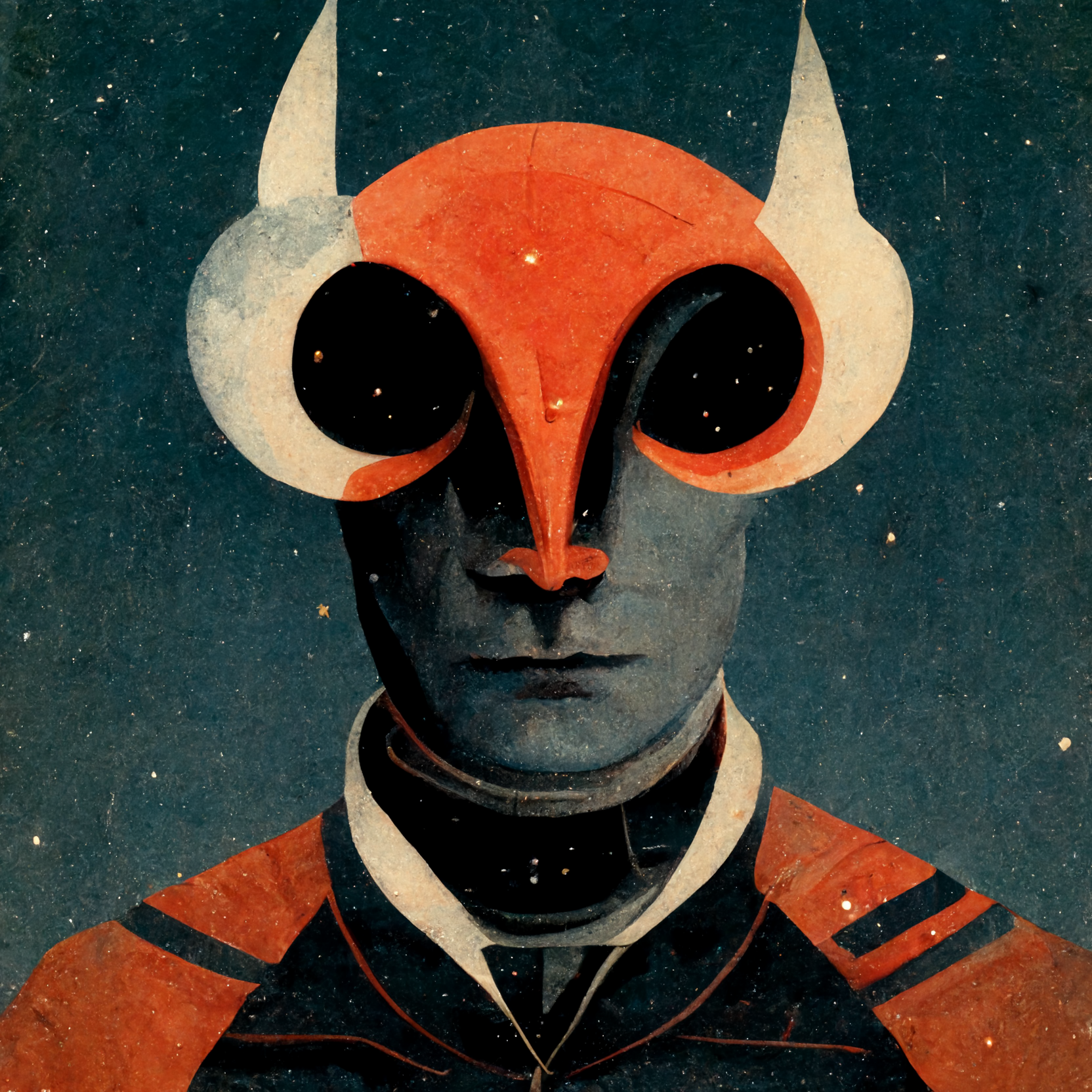BEELZEBUB’S TALES (1)
By:
February 19, 2023

Beelzebub’s Tales to His Grandson (dictated 1924–1927, and thus a work of Radium Age proto-sf, although it wouldn’t see publication until after the author’s death in 1949) is the first section of a never-completed magnum opus to be titled All and Everything. Gurdjieff would later explain that through this work he intended “to destroy, mercilessly, without any compromises whatsoever, in the mentation and feelings of the reader, the beliefs and views, by centuries rooted in him, about everything existing in the world.” HiLoBooks is pleased to serialize a selected excerpt from Beelzebub’s Tales here at HILOBROW.
ALL INSTALLMENTS: 1 | 2 | 3 | 4 | 5 | 6 | 7 | 8 | 9 | 10.
BOOK I
CHAPTER II: Prologue. Why Beelzebub was in our solar system
It in the year 223 after the creation of the world by objective time calculation or, as would be said here on the Earth, in the year 1921 after the birth of Christ.
Through the Universe flew the trans-space communication ship Karnak.
Having left the spaces of the “Assooparatsata,” that is, the “Milky Way,” it was flying from the planet “Karatas” to the solar system “Pandetznokh,” the sun of which is called the “Pole Star.”
On this trans-space ship was Beelzebub with his kinsmen and close companions.
He was on his way to the planet “Revozvradendr,” to a conference in which he had consented to take part, at the request of friends of long standing.
Only the remembrance of these old friendships had induced him to accept the invitation, for he was no longer young, and so lengthy a voyage with its inevitable hardships was by no means an easy task for one of his years.
A short time before this voyage Beelzebub had returned home to the planet Karatas, the place of his arising, and far from which, due to circumstances not depending on his essence, he had passed many years of his existence in conditions alien to his nature.
These long years of an existence unsuited to him, with all the perceptions and experiences foreign to his essence, had not failed to leave a noticeable mark on his common presence.
Time itself had by now inevitably aged him, and these unaccustomed conditions of existence had brought Beelzebub, that same Beelzebub who had had so exceptionally strong, fiery, and splendid a youth, to a no less exceptional old age.
Long, long before, when Beelzebub was still existing at home on the planet Karatas, he had been taken, owing to his extraordinarily resourceful intelligence, into service on the “Sun Absolute,” where our Lord Sovereign Endlessness has the fundamental place of His dwelling, and there Beelzebub, with a number of others like himself, had become an attendant upon His Endlessness.
But then, owing to his youthful and still unformed Reason, as well as to his callow and impetuous mentation with its unequally flowing associations, that is, a mentation based on a limited understanding which is natural for beings who have not yet become fully responsible Beelzebub once saw something in the government of the world that seemed to him “illogical” and, having found support among his comrades, unformed beings like himself, interfered in what was none of his business.
Thanks to the force and impetuosity of Beelzebub’s nature, his intervention, supported by his comrades, soon captured all minds and brought the central kingdom of the Megalocosmos to the brink of revolution.
Having learned of this, His Endlessness, notwithstanding His all-lovingness and all-forgivingness, was constrained to banish Beelzebub and his comrades to one of the remote corners of the Universe, to the solar system “Ors,” whose inhabitants call it simply “the solar system”, and He assigned as the place of their existence one of the planets of that solar system, namely the planet “Mars,” with the privilege of existing on other planets also, but only of that solar system.
Among these exiles, besides Beelzebub’s comrades, were many who had merely sympathized with him, as well as the attendants and subordinates of Beelzebub and his friends.
They all arrived with their entire households at this remote place and in a short time there was formed on the planet Mars a whole colony of “three-centered beings” from various planets of the central part of our Great Universe.
This population, so foreign to that planet, accommodated itself little by little to its new dwelling place, and to shorten the long years of exile, many of them found some occupation or other, either on Mars or on neighboring planets that had been almost entirely neglected because of their remoteness from the Center and the poverty of all their formations.
As the years rolled by, many of these exiles, either on their own initiative or in response to needs of a general character, gradually migrated from Mars to other planets, but Beelzebub himself with his close attendants remained on the planet Mars, where he organized his existence more or less tolerably.
One of his chief occupations was the setting up of an “observatory” on the planet Mars for the observation of remote points of the Universe as well as of the conditions of existence of beings on neighboring planets, and this observatory of his, by the way, later became well known and even famous everywhere in the Universe.
RADIUM AGE PROTO-SF: “Radium Age” is Josh Glenn’s name for the nascent sf genre’s c. 1900–1935 era, a period which saw the discovery of radioactivity, i.e., the revelation that matter itself is constantly in movement — a fitting metaphor for the first decades of the 20th century, during which old scientific, religious, political, and social certainties were shattered. More info here.
SERIALIZED BY HILOBOOKS: James Parker’s Cocky the Fox | Annalee Newitz’s “The Great Oxygen Race” | Matthew Battles’s “Imago” | & many more original and reissued novels and stories.
